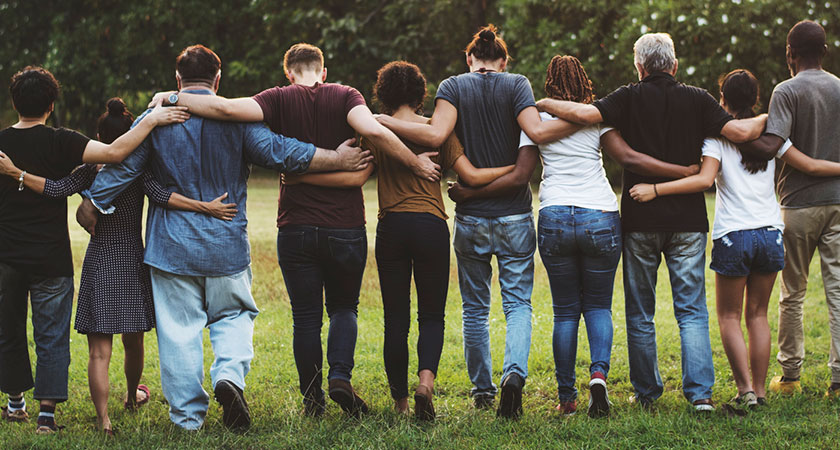Jon Kelly grew up in a tough, crime-ridden Philadelphia neighborhood. It wasn't long before he got involved with the rougher elements around him. He was eventually sentenced to prison at the age of 19 for third-degree murder.
After he was incarcerated, a corrections officer handed Jon a Bible, introducing him to the Gospel of Jesus Christ. Scripture opened his eyes and changed his heart, and Jon chose to live for Christ behind bars.
When he was released on parole, Jon once again faced an uncertain future. Returning citizens face more than 44,000 legal barriers to everyday concerns like where they can live and what kind of work they can do. Then there’s the social stigma that comes with having a criminal record.
Despite the uphill battle, Jon succeeded in reintegrating into society and didn’t return to prison. How did he do it? "More than anything, God changed my heart. But there were three resources that I had that most [formerly incarcerated] men and women don't have," he says.

THREE RESOURCES EVERY RETURNING CITIZEN NEEDS
A SAFE ENVIRONMENT
First, Jon was able to leave prison for a safe environment. During his time behind bars, his mother moved to a better neighborhood than the one of his childhood. Without the temptations of his former relationships, Jon could stay away from his old habits and lifestyle.
"I no longer had to live in the 'hood,’" Jon explains. "So, I didn't have to come home to an environment that was drug-infested, [had] people getting shot, and where there was temptation everywhere."
EMPLOYMENT
For many returning citizens, finding a job can be almost impossible due to their criminal past. Once their background check reveals a record, most employers won’t continue the hiring process.
When returning citizens can’t find work, they’re unable to meet their parole and probation requirements and can end up returning to prison.
COMMUNITY
The third resource Jon had was a church community willing to stand with him. A strong group of Christian men held Jon accountable, helped him along, and refused to let him fall back into his old habits.
"Before I went to prison, people all around me were drug dealers and killers," Jon says. "When I came home from prison, I was in the church mostly. My friends were engineers, lawyers, construction workers—my environment was totally different."
Jon’s church family could see past his criminal record and acknowledge his God-given potential. And it made a huge difference in how Jon thrived in his second chance at life.

THE CHURCH SHOULD LEAD THE WAY
Today, Jon is the pastor of Chicago West Bible Church. In the years since his release, he's had his fair share of struggles. He can't tell count how many times his job applications were rejected—he stopped after 67. But even so, he's managed to pursue both his education and his career as a minister.
He recognizes how his reentry got off on the right foot because he had people who cared about him—but not every returning citizen is so fortunate. Because of this, Jon works hard to advocate for the needs and rights of the formerly incarcerated.
And he believes the Church today should to lead the way, particularly when it comes to hospitality.
"I often say [to Christians] that if you're not letting a man or woman sit at your [dinner] table, you're really short-changing the process," Jon says. "There were people who accepted me into their homes, and there was a plate for me at their dinner table whenever I wanted it,” he explains.
Jon adds, “I had never seen a godly family before. I had never seen a man lead his family in prayer. I had never seen a guy act like an idiot and then have to go and ask his wife for forgiveness! But I learned all of that because I was around people enough that I was able to see their [lives]."
"The Gospel is all [relational]," Jon says. "And it's uncomfortable because it means you've got to see all my mess—you've got to give access to my heart in very vulnerable ways, but that's what men and women who are coming home from prison need."
SECOND CHANCES
Jon's story isn't unique. Every year, hundreds of thousands of prisoners are released and return to society. And like Jon, they need a second chance. The Church should be a place where they can easily find support and encouragement.
If you believe in second chances and want to help make your church a safe place for returning citizens, we invite you and your church to download the complimentary Second Chance Sunday Toolkit today. This carefully cultivated toolkit includes pastors' notes, a small-group discussion guide, sample bulletin inserts, and coloring pages for children—everything your church needs to host a Second Chance Sunday this April.
DID YOU ENJOY THIS ARTICLE?
Make sure you don' t miss out on any of our helpful articles and incredible transformation stories! Sign up to receive our weekly newsletter, and you' ll get great content delivered directly to your inbox.
Your privacy is safe with us. We will never sell, trade, or share your personal information.